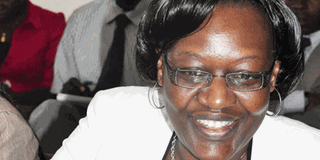IGG lacks capacity to verify public servants’ assets, says Mulyagonja

The Inspector General of Government, Ms Irene Mulyagonja while appearing before Legal and Parliamentary Affairs Committee yesterday. She told MPs that her office lacks capacity to implement the Leadership Code Act.
PHOTO BY Geoffrey seruyange
What you need to know:
Lacks funding. The IGG says the inspectorate requires between Shs7 million and Shs10 million to verify assets for a single leader.
PARLIAMENT.
The Inspector General of Government has admitted that although public officials are under legal obligation to declare their wealth every year, the inspectorate does not have the capacity to verify all the assets.
Ms Irene Mulyagonja’s confession, confirmed by Ethics minister Simon Lokodo, raised concerns that some leaders could be under-declaring their assets and defeating the intention of the Leadership Code Act in the fight against corruption.
Appearing before Legal and Parliamentary Affairs Committee yesterday to present her budget for 2014/15, Ms Mulyagonja said the inspectorate doesn’t have enough staff.
“To verify assets for a single leader, we require between Shs7 million and Shs10 million which we don’t have,” she said. “We received declarations from thousands of leaders but due to lack of capacity, we only chose a few.”
Under the Leadership Code Act, government officials are obliged to declare wealth every year but details of the declarations are never made public because there is no law that mandates the IGG to have the assets published. Because of lack of funds, the IGG samples 50 assets every year, something lawmakers questioned.
“We are going to try and add our voice to the concerns raised by the IGG,” Mr Steven Tashobya, the committee chairperson said. “The law is very clear, the assets must be verified and if the problem is funding, then we are going to meet ministry of Finance and discuss a way forward.”
Ministry of Finance spokesperson, Mr Jim Mugunga yesterday said, “the resource envelope is small”.
The executive director Anti-Corruption Coalition Uganda, Ms Cissy Kagaba, said more money should be provided to the IGG and that the law must be amended to make the information public. She observed that the political will to fight corruption goes hand in hand with facilitating the institutions to do their job.
Ms Mulyagonja noted that: “Corruption in Uganda is continuously changing form and involving wide networks of people both within and outside the country … there is need for continuous capacity building and acquisition of specialised equipment to support investigations and prosecutions.”
She told the committee that the Inspectorate allocates only Shs150 million for training and procurement of specialised equipment annually.
Because the Inspectorate is overwhelmed, Ms Mulyagonja said, they no longer accept the thousands of complaints relating to forgery and utterance of false documents.
“We have left those cases to police,” she said.
Yesterday, Rev Lokodo said Cabinet is in the process of improving the budget for IGG.
“The law is very clear, all leaders must declare their wealth and the IGG must verify them to ensure transparency and accountability,” Rev Lokodo said.
He added: “We have many leaders yet the IGG does not have capacity to cover all of them. They are doing selective verification as we push for more funding towards the fight against corruption. The IGG has more than 200 employees yet there are millions of assets to be verified.”
what the IGG wants
IGG wants to increases staffing levels to at least five officers, operational funds from Shs5m to Shs8million and provide each office with two vehicles. She said there is a funding gap of Shs4.4billion and including Shs1.5billion for salaries. The IGG budget for 2014/15 has stagnated at Shs35.4billion.




